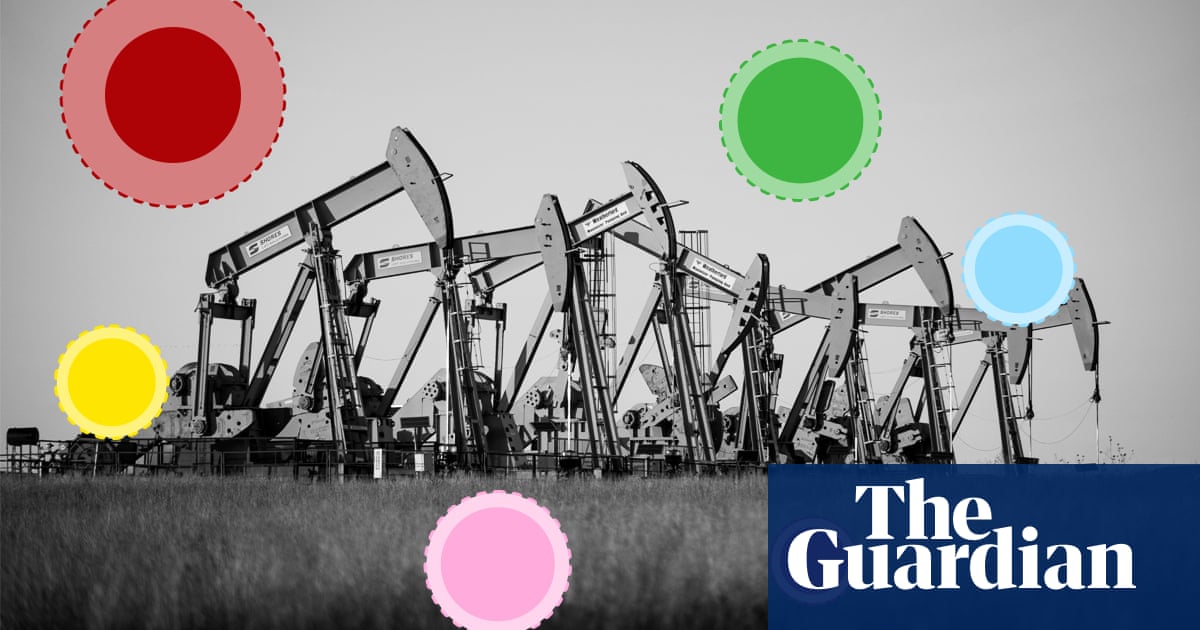
About half of the world’s fossil fuel assets will be worthless by 2036 under a net zero transition, according to research.
Countries that are slow to decarbonise will suffer but early movers will profit; the study finds that renewables and freed-up investment will more than make up for the losses to the global economy.
It highlights the risk of producing far more oil and gas than required for future demand, which is estimated to leave $11tn-$14tn (£8.1tn-£10.3tn) in so-called stranded assets – infrastructure, property and investments where the value has fallen so steeply they must be written off.
The lead author, Jean-Francois Mercure of the University of Exeter, said the shift to clean energy would benefit the world economy overall, but it would need to be handled carefully to prevent regional pockets of misery and possible global instability.
“In a worst-case scenario, people will keep investing in fossil fuels until suddenly the demand they expected does not materialise and they realise that what they own is worthless. Then we could see a financial crisis on the scale of 2008,” he said, warning oil capitals such as Houston could suffer the same fate as Detroit after the decline of the US car industry unless the transition is carefully managed.
The challenge is evident at the ongoing Cop26 climate conference, where some of the nations most at risk of being left with stranded assets – such as the oil and gas exporters Russia and Brazil – are likely to try to slow down the transition as they have done at previous climate meetings, while those most likely to gain – such as the fuel-importing EU – are pushing for faster action.
The new paper, published in Nature Energy, illustrates how a drop in demand for oil and gas before 2036 will reshape the geopolitical landscape. Current investment flows and government commitments to reach net zero emissions by 2050 will make renewable energy more efficient, cheaper and stable, while fossil fuels will be hit by more price volatility. Many carbon assets, such as oil or coal reserves, will be left unburned, while machinery will also be stranded and no longer produce value for its owners.
The most vulnerable assets are those in remote regions or technically challenging environments. Most exposed are Canadian tar sands, US shale and the Russian Arctic followed by deep offshore wells in Brazil and elsewhere. North Sea oil is also relatively expensive to extract and likely to be hit when demand falls.
By contrast, current oil, gas and coal importers such as the EU, Japan, India and South Korea, will reap hefty economic dividends from the transition because they will be able to use the money they save on overseas fuel purchases to invest in their own countries, including money for renewables that will modernise infrastructure, create jobs and improve energy independence.
The situation for the world’s two biggest emitters – the US and China – is more complex as they have more diversified economies with both substantial fossil fuel assets and powerful renewable sectors. The UK is in a similar situation, but as a net energy importer, stands to benefit overall.
Much depends on the speed and spread of decarbonisation, along with the tactics used by fossil fuel exporters to sell off their assets before they lose value. To assess the impacts, the study explored several different scenarios.
The model forecasts large economic benefits for most importers of fossil fuels. The GDP of most European countries would increase under either net zero scenario, researchers found, with gains outstripping the lost fossil fuel revenue.
The benefits vary across nations. The UK, for example, would potentially add $700bn to the value of its GDP under a net zero scenario, despite losing almost half of its fossil fuel assets, worth $120bn, by 2036. By contrast, the GDP of Norway, which is more dependant on oil exports, could fall by 9% unless it diversifies rapidly.
The US could also face an overall hit of $3.5tn and Canada $920bn over the next 15 years if they do not reduce their economic dependence on fossil fuels. The projected losses in these two North American nations are independent of domestic climate policies because they stem mostly from a decline in demand for petroleum products once major markets such as the EU and China have shifted towards net zero.
The extent of asset stranding will partly depend on low-cost producers, such as Saudi Arabia and the rest of the Opec group of oil-producing states. If they ramp up production and begin a fire-sale-style selloff, other exporters could be priced out, leading to a sudden collapse. Under this scenario $11tn of global fossil fuel assets would be stranded.
However, if oil producers agreed on a quota system, the effects could be more evenly distributed and lower overall, though would still eventually reach $11tn of stranded assets, according to the projections. For a nation such as Canada, this could mean a 5% fall in GDP relative to business as usual, compared with 7% under the fire-sale scenario – a difference of about $400bn.
Opec nations are likely to demand hefty compensation for lost revenue if they agree to quotas. Saudi Arabia, for example, would make only $1.3tn under a quota scenario, compared with $1.7tn from a fire sale.
The authors of the study say a race to the bottom should be avoided at all costs.
“If Saudi Arabia plays one way and the US another way, then we will see economic, financial and political instability worldwide, banks going bust and changes in capital flows. People need to think about these transition risks very seriously,” said Mercure, adding that major institutions, including the Bank of England and the Bank of France, were increasingly concerned about the potential dangers to the financial system.
To prevent chaos, he said, oil exporters should diversify their economies as quickly as possible before change is forced on them when importers switch to renewables. Even more important, he said, was closer engagement between the two sides so the overall economic benefits of transition could be shared. “This needs to be a story of international cooperation and not leaving people behind.”
Source: Guardian







